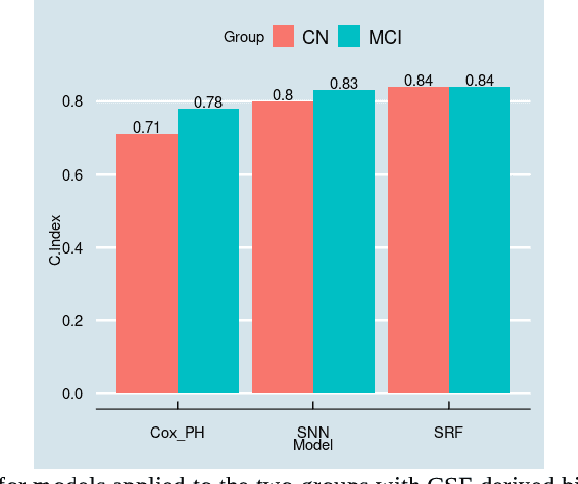Henry Musto
Predicting Deterioration in Mild Cognitive Impairment with Survival Transformers, Extreme Gradient Boosting and Cox Proportional Hazard Modelling
Sep 24, 2024Abstract:The paper proposes a novel approach of survival transformers and extreme gradient boosting models in predicting cognitive deterioration in individuals with mild cognitive impairment (MCI) using metabolomics data in the ADNI cohort. By leveraging advanced machine learning and transformer-based techniques applied in survival analysis, the proposed approach highlights the potential of these techniques for more accurate early detection and intervention in Alzheimer's dementia disease. This research also underscores the importance of non-invasive biomarkers and innovative modelling tools in enhancing the accuracy of dementia risk assessments, offering new avenues for clinical practice and patient care. A comprehensive Monte Carlo simulation procedure consisting of 100 repetitions of a nested cross-validation in which models were trained and evaluated, indicates that the survival machine learning models based on Transformer and XGBoost achieved the highest mean C-index performances, namely 0.85 and 0.8, respectively, and that they are superior to the conventional survival analysis Cox Proportional Hazards model which achieved a mean C-Index of 0.77. Moreover, based on the standard deviations of the C-Index performances obtained in the Monte Carlo simulation, we established that both survival machine learning models above are more stable than the conventional statistical model.
A Machine Learning Approach for Predicting Deterioration in Alzheimer's Disease
Jun 17, 2023Abstract:This paper explores deterioration in Alzheimers Disease using Machine Learning. Subjects were split into two datasets based on baseline diagnosis (Cognitively Normal, Mild Cognitive Impairment), with outcome of deterioration at final visit (a binomial essentially yes/no categorisation) using data from the Alzheimers Disease Neuroimaging Initiative (demographics, genetics, CSF, imaging, and neuropsychological testing etc). Six machine learning models, including gradient boosting, were built, and evaluated on these datasets using a nested crossvalidation procedure, with the best performing models being put through repeated nested cross-validation at 100 iterations. We were able to demonstrate good predictive ability using CART predicting which of those in the cognitively normal group deteriorated and received a worse diagnosis (AUC = 0.88). For the mild cognitive impairment group, we were able to achieve good predictive ability for deterioration with Elastic Net (AUC = 0.76).
Predicting Risk of Dementia with Survival Machine Learning and Statistical Methods: Results on the English Longitudinal Study of Ageing Cohort
Jun 17, 2023Abstract:Machine learning models that aim to predict dementia onset usually follow the classification methodology ignoring the time until an event happens. This study presents an alternative, using survival analysis within the context of machine learning techniques. Two survival method extensions based on machine learning algorithms of Random Forest and Elastic Net are applied to train, optimise, and validate predictive models based on the English Longitudinal Study of Ageing ELSA cohort. The two survival machine learning models are compared with the conventional statistical Cox proportional hazard model, proving their superior predictive capability and stability on the ELSA data, as demonstrated by computationally intensive procedures such as nested cross-validation and Monte Carlo validation. This study is the first to apply survival machine learning to the ELSA data, and demonstrates in this case the superiority of AI based predictive modelling approaches over the widely employed Cox statistical approach in survival analysis. Implications, methodological considerations, and future research directions are discussed.
Predicting Alzheimers Disease Diagnosis Risk over Time with Survival Machine Learning on the ADNI Cohort
Jun 17, 2023



Abstract:The rise of Alzheimers Disease worldwide has prompted a search for efficient tools which can be used to predict deterioration in cognitive decline leading to dementia. In this paper, we explore the potential of survival machine learning as such a tool for building models capable of predicting not only deterioration but also the likely time to deterioration. We demonstrate good predictive ability (0.86 C-Index), lending support to its use in clinical investigation and prediction of Alzheimers Disease risk.
 Add to Chrome
Add to Chrome Add to Firefox
Add to Firefox Add to Edge
Add to Edge